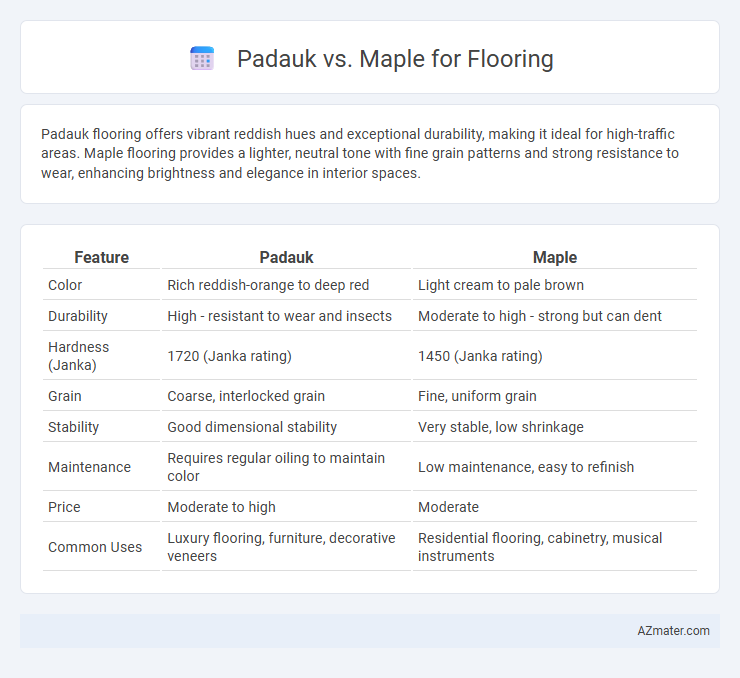Padauk flooring offers vibrant reddish hues and exceptional durability, making it ideal for high-traffic areas. Maple flooring provides a lighter, neutral tone with fine grain patterns and strong resistance to wear, enhancing brightness and elegance in interior spaces.
Table of Comparison
| Feature | Padauk | Maple |
|---|---|---|
| Color | Rich reddish-orange to deep red | Light cream to pale brown |
| Durability | High - resistant to wear and insects | Moderate to high - strong but can dent |
| Hardness (Janka) | 1720 (Janka rating) | 1450 (Janka rating) |
| Grain | Coarse, interlocked grain | Fine, uniform grain |
| Stability | Good dimensional stability | Very stable, low shrinkage |
| Maintenance | Requires regular oiling to maintain color | Low maintenance, easy to refinish |
| Price | Moderate to high | Moderate |
| Common Uses | Luxury flooring, furniture, decorative veneers | Residential flooring, cabinetry, musical instruments |
Introduction to Padauk and Maple Flooring
Padauk flooring is renowned for its vibrant reddish-orange hues and exceptional durability, making it a popular choice for high-traffic interiors. Maple flooring offers a lighter, creamy color palette with fine, uniform grain patterns, prized for its hardness and smooth finish. Both hardwoods provide excellent wear resistance, but Padauk's exotic appeal contrasts with Maple's classic versatility in home design.
Key Characteristics of Padauk Wood
Padauk wood is prized for its rich, vibrant reddish-orange color that deepens over time, creating a unique and striking appearance for flooring. Its high density and hardness provide excellent durability and resistance to dents and scratches, making it ideal for high-traffic areas. Padauk's natural oils contribute to its resistance against moisture and decay, ensuring longevity and minimal maintenance in flooring applications.
Key Characteristics of Maple Wood
Maple wood is prized for its durability, fine grain, and light, uniform color, making it an excellent choice for flooring that demands both strength and aesthetic appeal. Its hardness rank on the Janka scale is approximately 1450, offering good resistance to wear and denting, ideal for high-traffic areas. The subtle grain pattern of maple provides a smooth finish that pairs well with various interior styles, enhancing the flooring's versatility compared to the exotic, reddish hues of Padauk.
Color and Grain Comparison
Padauk flooring showcases a vibrant reddish-orange hue that deepens over time to a rich, warm tone, contrasting sharply with Maple's light creamy to pale yellow shades. The grain of Padauk is generally straight but can present interlocking patterns, offering a bold and exotic visual texture, while Maple features a fine, uniform grain with subtle curly or birdseye patterns that provide a smooth, elegant appearance. Colorfastness favors Padauk's vivid tones that maintain intensity with age, whereas Maple may darken slightly, developing a soft patina that enhances its subtle grain character.
Durability and Hardness Differences
Padauk flooring features a Janka hardness rating of approximately 1,900, making it significantly harder and more durable than Maple, which has a Janka rating around 1,450. This increased hardness in Padauk grants it superior resistance to dents and scratches, ideal for high-traffic areas. Maple's slightly softer nature offers easier workability but may show wear faster under heavy use compared to Padauk's robust performance.
Maintenance and Care Requirements
Padauk flooring requires regular dusting and occasional polishing to maintain its vibrant reddish hue, while exposure to direct sunlight can cause color fading over time. Maple floors need frequent cleaning to prevent dirt buildup, along with periodic refinishing to address surface wear and maintain their smooth texture. Both hardwoods benefit from controlled indoor humidity to prevent warping and cracking, but Padauk's natural oils offer slightly better resistance to moisture-related damage than Maple.
Cost and Availability
Padauk flooring typically commands a higher price due to its exotic status and vibrant reddish hue, which is less commonly available than Maple. Maple is widely accessible in most markets, offering a more budget-friendly option with consistent supply and lower transportation costs. Choosing Maple ensures cost efficiency and better availability for large-scale projects or renovations.
Environmental Impact and Sustainability
Padauk flooring, derived from the Pterocarpus genus, is known for its rapid growth and carbon-sequestering properties, making it a more sustainable choice compared to slower-growing hardwoods. Maple, a dense hardwood typically harvested from mature trees, has a higher impact due to longer growth cycles and less carbon absorption over time. Certifications like FSC for both woods ensure responsible harvesting, but Padauk's faster renewability and lower ecological footprint provide a significant environmental advantage in sustainable flooring decisions.
Best Applications for Each Wood Type
Padauk flooring excels in high-traffic areas such as living rooms and hallways due to its exceptional hardness and vibrant reddish-orange hue, which enhances modern and eclectic interior designs. Maple flooring is ideal for kitchens and bedrooms, offering a smooth, fine grain with excellent durability and a light, neutral tone that complements both traditional and contemporary styles. Both woods perform well in residential settings, but Padauk offers greater resistance to dents and wear, making it suitable for commercial applications, while Maple's subtle aesthetic suits spaces prioritizing warmth and brightness.
Choosing Between Padauk and Maple
Padauk flooring offers deep reddish tones and exceptional durability, making it ideal for high-traffic areas, while Maple flooring provides a lighter, more neutral aesthetic with fine grain patterns suited for bright, modern interiors. Both hardwoods rank high in hardness--Padauk at around 1720 Janka and Maple at approximately 1450 Janka--ensuring long-lasting surfaces, but Padauk's superior moisture resistance gives it an edge in humid environments. Selecting between Padauk and Maple depends on desired color warmth, durability needs, and maintenance preferences for your specific flooring project.

Infographic: Padauk vs Maple for Flooring
 azmater.com
azmater.com